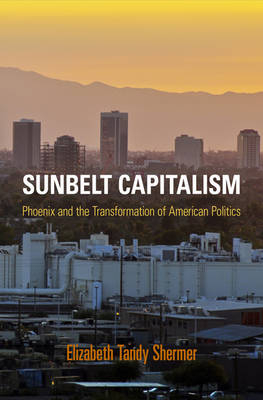
Sunbelt Capitalism
Phoenix and the Transformation of American Politics
Seiten
2013
University of Pennsylvania Press (Verlag)
978-0-8122-4470-0 (ISBN)
University of Pennsylvania Press (Verlag)
978-0-8122-4470-0 (ISBN)
- Keine Verlagsinformationen verfügbar
- Artikel merken
Historian Elizabeth Tandy Shermer examines how Barry Goldwater and elite Phoenix businessmen used policy and federal funds to fashion a postwar "business climate," setting off an interstate competition for investment that transformed American politics.
Few Sunbelt cities burned brighter or contributed more to the conservative movement than Phoenix. In 1910, eleven thousand people called Phoenix home; now, over four million reside in this metropolitan region. In Sunbelt Capitalism, Elizabeth Tandy Shermer tells the story of the city's expansion and its impact on the nation. The dramatic growth of Phoenix speaks not only to the character and history of the Sunbelt but also to the evolution in American capitalism that sustained it.
In the 1930s, Barry Goldwater and other members of the Phoenix Chamber of Commerce feared the influence of New Deal planners, small businessmen, and Arizona trade unionists. While Phoenix's business elite detested liberal policies, they were not hostile to government action per se. Goldwater and his contemporaries instead experimented with statecraft now deemed neoliberal. They embraced politics, policy, and federal funding to fashion a favorable "business climate," which relied on disenfranchising voters, weakening unions, repealing regulations, and shifting the tax burden onto homeowners and consumers. These efforts allied them with executives at the helm of the modern conservative movement, whose success partially hinged on relocating factories from the Steelbelt to the kind of free-enterprise oasis that Phoenix represented. But the city did not sprawl in a vacuum. All Sunbelt boosters used the same incentives to compete at a fever pitch for investment, and the resulting drain of jobs and capital from the industrial core forced Midwesterners and Northeasterners into the brawl. Eventually this "Second War Between the States" reoriented American politics toward the principle that the government and the citizenry should be working in the interest of business.
Few Sunbelt cities burned brighter or contributed more to the conservative movement than Phoenix. In 1910, eleven thousand people called Phoenix home; now, over four million reside in this metropolitan region. In Sunbelt Capitalism, Elizabeth Tandy Shermer tells the story of the city's expansion and its impact on the nation. The dramatic growth of Phoenix speaks not only to the character and history of the Sunbelt but also to the evolution in American capitalism that sustained it.
In the 1930s, Barry Goldwater and other members of the Phoenix Chamber of Commerce feared the influence of New Deal planners, small businessmen, and Arizona trade unionists. While Phoenix's business elite detested liberal policies, they were not hostile to government action per se. Goldwater and his contemporaries instead experimented with statecraft now deemed neoliberal. They embraced politics, policy, and federal funding to fashion a favorable "business climate," which relied on disenfranchising voters, weakening unions, repealing regulations, and shifting the tax burden onto homeowners and consumers. These efforts allied them with executives at the helm of the modern conservative movement, whose success partially hinged on relocating factories from the Steelbelt to the kind of free-enterprise oasis that Phoenix represented. But the city did not sprawl in a vacuum. All Sunbelt boosters used the same incentives to compete at a fever pitch for investment, and the resulting drain of jobs and capital from the industrial core forced Midwesterners and Northeasterners into the brawl. Eventually this "Second War Between the States" reoriented American politics toward the principle that the government and the citizenry should be working in the interest of business.
Elizabeth Tandy Shermer teaches history at Loyola University Chicago. She is coeditor (with Nelson Lichtenstein) of The Right and Labor in America: Politics, Ideology, and Imagination, which is also available from the University of Pennsylvania Press.
Introduction
PART I. DESERT
Chapter 1. Colonial Prologue
Chapter 2. Contested Recovery
Chapter 3. The Business of War
PART II. RECLAMATION
Chapter 4. The Right to Rule
Chapter 5. Grasstops Democracy
Chapter 6. Forecasting the Business Climate
Chapter 7. "Second War Between the States"
PART III. SPRAWL
Chapter 8. Industrial Phoenix
Chapter 9. The Conspicuous Grasstops
Chapter 10. "A Frankenstein's Monster"
Epilogue. Whither Phoenix?
List of Abbreviations
Notes
Index
Acknowledgments
| Reihe/Serie | Politics and Culture in Modern America |
|---|---|
| Zusatzinfo | 18 illus. |
| Verlagsort | Pennsylvania |
| Sprache | englisch |
| Maße | 152 x 229 mm |
| Themenwelt | Geisteswissenschaften ► Geschichte ► Regional- / Ländergeschichte |
| Sozialwissenschaften ► Soziologie | |
| ISBN-10 | 0-8122-4470-2 / 0812244702 |
| ISBN-13 | 978-0-8122-4470-0 / 9780812244700 |
| Zustand | Neuware |
| Haben Sie eine Frage zum Produkt? |
Mehr entdecken
aus dem Bereich
aus dem Bereich
Universalgelehrter, Polarreisender, Entdecker
Buch | Hardcover (2024)
mareverlag
28,00 €


